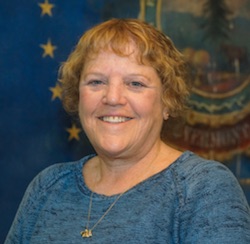The House Education Committee on Thursday approved a bill that would provide universal breakfast and lunch for all school children regardless of each family’s ability to provide their own meals or lunch money.
Lawmakers approved S.100, the Universal School Meals Act, for one year only. The state would use $29 million in surplus funds from the education fund to pay for the meals.
Cost has been a significant barrier to the legislation so far. Early estimates for the program, if fully implemented, could be as much as $35 million to $38 million annually. While lawmakers have considered taxing candy, sweetened beverages and even computer software to raise that money, Gov. Phil Scott’s administration is opposed to any new taxes.

Rep. Sarah Austin, D-Colchester
Rep. Sarah Austin, D-Colchester, told fellow committee members she’s not sure her local education leaders will be on board with the program given the cost to taxpayers. She was one of the committee’s two no-votes.
“I still can’t support this bill,” Austin said. “But I feel this here will buy us time in terms of answering some of my questions about data — it would be more informed for me.
“I need to talk to my constituents more when I’m canvassing this summer. This is a big pot of money. And, really, if my constituents are supportive of this as I go around town, and again return to the schools and talk to the superintendent and the business manager and if they support it, I will support it. But I just don’t have a sense of that in terms of their priorities.”
Austin said education officials are currently dealing with recently the state passed legislation asking them to screen for and take out any PCBs discovered in the school buildings.
Rep. Lawrence Cupoli, R-Rutland, the committee’s vice-chair, was the other no-vote.
Jeffrey Francis, executive director of the Vermont Superintendents Association, told the committee last week that some education leaders would like to see the money spent on other pressing issues — teacher shortages and special education shortages are likely higher priorities in terms of the need for financial resources.
Rep. Casey Toof, R-St. Albans Town, agreed with the notion that students from all income backgrounds may benefit from public meals.
“What I would say is that 38% of students across supervisory unions qualified for it [public assistance for school food] but many kids still come to school hungry,” he said. “I would say it doesn’t matter the economic status at home; kids still come to school hungry, some kids just don’t have breakfast at home, or just ran out too late.”
Rep. Terri Lynn Williams, D-Essex/Caledonia, suggested that school principals in her district would support this bill.
“I would just like you all to know that I reached out to my principals and there was one retired teacher that wanted to share her thoughts, and in our very poor location, and they all still — even though I gave them all possible scenarios — they all still supported feeding the children,” Williams said. “They know the difference between a fed child and an unfed child and how it affects their learning.”
On Wednesday, Faye Mack, the advocacy and education director of Hunger Free Vermont, commented on the status of federal funding that currently supports state school meal programs, including that she wouldn’t count too much on new huge federal investments.
“They have been examining waiver extensions to continue what we are doing now for another year; there has also been a proposal to expand eligibility for universal school meals in a way that would lower the cost to the state,” Mack said. “There has been a bill proposed for full universal school meals, so at the federal level I think there is intent to move towards this. What they are able to get done remains to be seen, and I wouldn’t put money on it.”
If enacted, the free meals program would apply to the 2022-2023 school year.
Michael Bielawski is a reporter for True North. Send him news tips at bielawski82@yahoo.com and follow him on Twitter @TrueNorthMikeB.



We have had this in my NH school district all year- free lunch for all.
BUT I happen to know that there is a 50% “poverty rate” or, 50% of the students applied and qualify for free lunch- so 50% of the rest of the students are getting a free lunch that don’t even need it.
This sounds like a Free Lunch and a Free Ride on the taxpayers- for all of us- NH and VT.
And what about the fvcking Vermont schools that have no cafeteria? What about them? Not that I like the people of Norwich, but Marion Cross Elementary does not provide any kind of school food at all to their students and most of their mommies and daddies, or mommies and mommies or daddies and daddies, or other, send their kids to school with tofu salad and crap most kids don’t want to eat anyway, but I digress. My kids went there and their lunches were the envy of most of their classmates, again I digress. I am sure Marion Cross is not the only school in this hellhole of a socialist mine field of “right think” to not have a cafeteria.
Kc I suppose you have a have a big protest with flags and costumes, this seems to be how they want us to do things now.
Maybe you can paint the entire main street like they let BLM do?
“Make Cafeterias Great Again” should look nice painted on the tar…
This all seems only fair.
They have now opened pandora’s box.
If the object of this is stop bullying, its a nonsense approach. Go directly to the problem and require classes in ethics and morals with classwork on compassion and caring, understanding others lives and how they live.